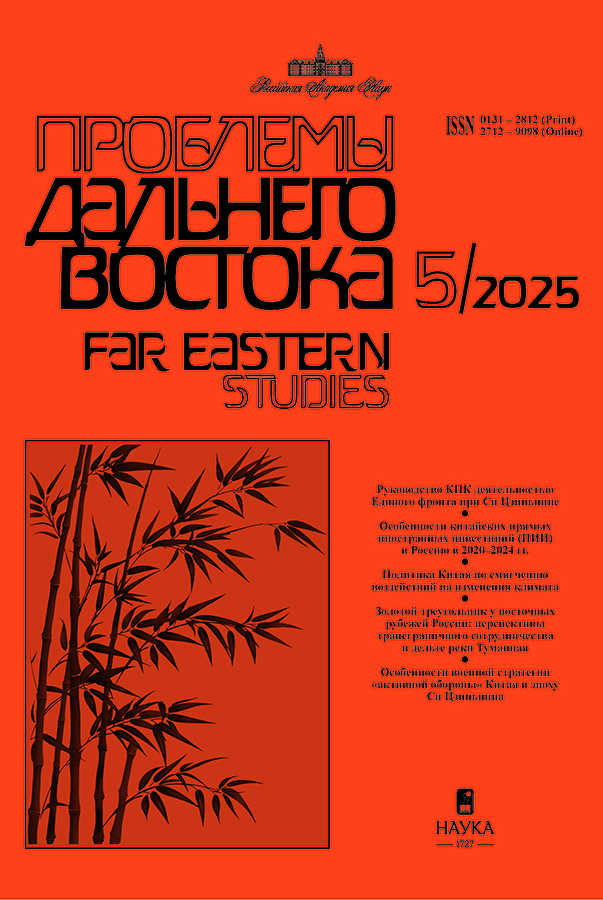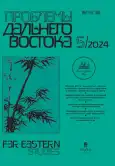Youth Policy and Patriotic Education during the Yusin Period (1972–1979)
- Authors: Starshinov A.S1
-
Affiliations:
- Lomonosov Moscow State University
- Issue: No 5 (2024)
- Pages: 171-186
- Section: History
- URL: https://gynecology.orscience.ru/0131-2812/article/view/676270
- DOI: https://doi.org/10.31857/S0131281224050126
- ID: 676270
Cite item
Abstract
The article examines the features of South Korean patriotic discourse and youth policy in the 1970s through the prism of “total harmony” (cheonghwa), which was the dominant ideology of the Yusin system. The establishment of a mass school system served as the foundation for implementing patriotic education during this period, enabling the standardization of educational materials that emphasized the primacy of the nation over the individual. This system also facilitated the dissemination of patriotic practices and values associated with the defense of the Fatherland. During this period, youth policy aimed to construct a new image of young people by, on the one hand, mitigating class and status differences within this demographic, and on the other hand, addressing intensified generational, socio-economic, and political conflicts in 1970s South Korean society through the promotion of universal category of filial piety. The New Village Movement, integrated into the education system and disseminated nationwide, served as the practical embodiment of the values of “total harmony”. With a well-developed infrastructure for promoting spiritual education and “practical” patriotism, the movement also dominated volunteer activities. Through Saemaeul education, the ideology of the Yusin period emphasized themes of equality and egalitarianism, presenting young people with role models such as loyal students and volunteers contributing to the country's modernization.
Keywords
About the authors
A. S Starshinov
Lomonosov Moscow State University
Author for correspondence.
Email: alex.starshinov@gmail.com
ORCID iD: 0000-0001-9169-1414
Ph.D. student, Institute of Asian and African Studies
MoscowReferences
- Althusser L. Ideologiya i ideologicheskie apparaty gosudarstva (zametki dlya issledovaniya) [Ideology and Ideological State Apparatuses (Notes Towards an Investigation)]. Neprikosnovennyj zapas. 2011. No. 3 (77). S. 159–175. (In Russ.)
- Brubaker R. Imenem nacii: Razmyshleniya o nacionalizme i patriotizme [In the Name of the Nation: Reflections on Nationalism and Patriotism]. Ab Imperio. 2006. No. 2. S. 59–79. (In Russ.)
- Kurbanov S.O. Konfucianskij klassicheskij «Kanon synovnej pochtitel'nosti» v korejskoj traktovke. Korejskoe vospriyatie universal'noj kategorii «pochtitel'nosti k roditelyam» [The Classic of Filial Piety in Korean Interpretation. Korean Perception of the Universal Category of “Filial Piety”]. SPb.: Izd-vo S.-Peterb. un-ta, 2007. 280 s. (In Russ.)
- Kurmyzov A.A. Vozrozhdenie «slavnogo proshlogo» v Respublike Koreya v period pravleniya Park Chung Hee [The Revival of the “Glorious Past” in the Republic of Korea under Park Chung Hee]. Vestnik RUDN. Seriya: Vseobshchaya istoriya. 2023. No. 4. S. 374–392. (In Russ.)
- Pak M.N. Ocherki po istoriografii Korei. K kritike burzhuazno-nacionalisticheskih idej yuzhnokorejskih istorikov [Essays on Korean Historiography. Toward Criticism of the Bourgeois-Nationalist Ideas of South Korean Historians]. M.: Nauka, 1987. 147 s. (In Russ.)
- Brandt V. The New Community Movement. Planned and Unplanned Change in Rural Korea // Journal of Asian and African Studies. 1978. Vol. 13. No. 3-4. Pp. 196-211.
- Eisenstadt S. From Generation to Generation: Age Groups and Social Structure. Glencoe, Illinois: The Free Press, 1956. 357 p.
- Kim C. Divided Korea: The Politics of Development, 1945-1972. Cambridge, Mass.: East Asian Research Center, 1975. 471 p.
- Kim D. Renovation of Ethical Views in Korea // Korea Journal. 1973. Vol. 13. No. 2. Pp. 4-9.
- Kim K. Social Discontinuities and Korean Politics: Reflections of a Theorist // The Journal of Asiatic Studies. 1972. Vol. 15. No. 2. Pp. 153-163.
- Parsons T. Youth in the Context of American Society // Daedalus. 1962. Vol. 91. No. 1. Pp. 97-123.
- Seth M. Education Fever: Society, Politics, and the Pursuit of Schooling in South Korea. Honolulu: University of Hawai'i Press, 2002. 305 p.
- 년도 국방대학원 졸업식 및 제20기 합동 참모대학 졸업식 유시 [1973 National Defense Graduate School Commencement Ceremony and 20th Joint Command and Staff College Graduation Ceremony Speech]. 대통령기록관. 20.07.1973. URL: https://bit.ly/3XKNQhf (accessed: 26.09.2024). (In Kor.)
- 년 연두 기자회견 [1974 New Year's Press Conference]. 대통령기록관. 18.01.1974. URL: https://bit.ly/3zUYA4N (accessed: 26.09.2024). (In Kor.)
- 년 연두 기자회견 [1977 New Year's Press Conference]. 대통령기록관. 12.01.1977. URL: https://bit.ly/3ZL№ 9XC (accessed: 26.09.2024). (In Kor.)
- 구경남. 1970년대 국정 >국사< 교과서에 나타난 애국심 교육과 국가주의 [Ku Kyeong-nam. Patriotism Education and Nationalism in Government Designated Korean History Textbook in the 1970s]. 역사교육연구. 2014. 제19호. 347–383 쪽. (In Kor.)
- 국민교육헌장선포 제5주년 기념식 치사 [Congratulatory Speech at the Ceremony in Honor of the 5th Anniversary of the Proclamation of the Charter of Public Education]. 대통령기록관. 05.12.1973. URL: https://bit.ly/4gLBJtk (accessed: 26.09.2024). (In Kor.)
- 金命祚. 餘暇善用과 靑少年善導策. Recreation 問題의 提起 [Kim Myung-jo. Towards the Formulation of the Problem of Leisure: The Sound Use of Free Time and Youth Guidance]. 한국체육학회. 1975. 11권. 147–157 쪽. (In Kor.)
- 김원. 여공 1970, 그녀들의 反역사 [Kim Won. Women Workers in the 1970s: Their Counter-history]. 서울: 이매진, 2005. 860 쪽. (In Kor.)
- 김현선. 애국주의의 내용과 변화: 1960–90년대 교과서 분석을 중심으로 [Kim Hyeon-seon. The Content and Change of Patriotism in Korea: Focusing on Textbooks during the 1960s—1990s]. 정신문화연구. 2002. 제25권. 제2호. 177–205 쪽. (In Kor.)
- 박길성. 1960년대 인구사회학적 변화와 도시화 [Pak Kilson. Socio-demographic changes and urbanization in the 1960s.]. 1960년대의 사회변화연구 (1963–1970). 백산서당, 1999. 11–54 쪽. (In Kor.)
- 박정희. 민족중흥의 길 [Park Chung-hee. The Path of National Revival]. 서울: 기파랑, 2017. 228 쪽. (In Kor.)
- 박진우. 박정희정권과 새마을지도자연수원의 지도자 양성 [Park Jin-woo. The Park Chung-Hee Regime and Leadership Education in the Saemaeul Leadership Training Institute]. 한국민족운동사연구. 2010. 제65호. 279–317 쪽. (In Kor.)
- 배성인. 유신체제의 지배이데올로기와 대중 통제 [Bae Seong-in. The Dominant Ideology of the Yushin System and Control of the Public]. 유신을 말하다. 서울: 나름북스, 2013. 205–252 쪽. (In Kor.)
- 維維의 理理 [Ideas of the Yusin system]. 서울: 國國國國國國研國國, 1973. 185쪽. 은정태. 박정희시대 성역화사업의 추이와 성격 [Eun Jeong-tae. Creation of “Sacred Places” during Park Chung-hee’s Era and Its Characteristics]. 역사문제연구. 2005. 제15권. 241–277 쪽. (In Kor.)
- 이경숙. 유신과 대학 [Lee Kyung-suk. Yushin System and Higher Education Institutions]. 서울: 역락, 2018. 196쪽. (In Kor.)
- 이상록. 고도성장기 서민의 체감경제 [Lee Sang-rok. The Economics of Ordinary People's Experiences during a Period of Rapid Economic Growth]. 한국현대 생활문화사 1970년대: 새마을운동과 미니스커트. 서울: 창비, 2016. 145–170 쪽. (In Kor.)
- 자유 수호의 길 [The Path of Defending Freedom]. 문교부, 1976. 236 쪽. (In Kor.)
- 전국 새마을 지도자 대회 유시 [Speech Given at the Saemaeul National Leadership Conference]. 대통령기록관. 22.11.1973. URL: https://bit.ly/4djGOWE (accessed: 26.09.2024). (In Kor.)
- 제26주년 광복절 경축사 [Speech at the Celebration of the 26th Anniversary of Liberation Day). 대통령기록관. URL: https://bit.ly/3zBpnDb (дата обращения: 26.09.2024). (In Kor.)
- 최광승. 유신체제기 박정희 정권의 애국적 국민 생산 프로젝트: 화랑도와 화랑교육원을 중심으로 [Choi Kwang-seung. Project for Making Patriotic People during Yushin Period of Park Chung Hee Regime: Based on the Case of Hwarangdo and Hwarang Educational Institute]. 한국학연구. 2014. 제33집. 237–275 쪽. (In Kor.)
- 학도호국단설치령 [Decree on the Establishment of the Korean National Defense Student Corps]. 법제처, 1975. URL: https://bit.ly/3TNERuK (accessed: 26.09.2024). (In Kor.)
- 한만길. 유신체제 반공교육의 실상과 영향 [Han Man-gil. The Reality and Impact of Anticommunist Education in the Yusin System]. 역사비평. 1997. 통권 38호. 333–347 쪽. (In Kor.)
- 허은. 유신시대 학교와 학생의 일상사 [Heo Eun. Schools during the Yushin Period and Students’ Daily Lives]. 한국현대 생활문화사 1970년대: 새마을운동과 미니스커트. 서울: 창비, 2016. 35–59 쪽. (In Kor.)
- 황병주. 고교 평준화, 불평등을 위한 평등한 경쟁 [Hwang Byung-ju. School Equalization Policy: Equal Competition for the Sake of Inequality]. 1970, 박정희 모더니즘. 서울: 천년의상상, 2015. 202–215 쪽. (In Kor.)
- 황병주. 박정희 체제의 지배담론과 대중의 국민화 [Hwang Byung-ju. The Dominant Discourse of the Park Chung-hee Regime and the Transformation of the Public into “Citizens”]. 대중독재: 강제와 동의 사이에서. 임지현, 김용우 편. 서울: 책세상, 2004, 475–516 쪽. (In Kor.)
Supplementary files








